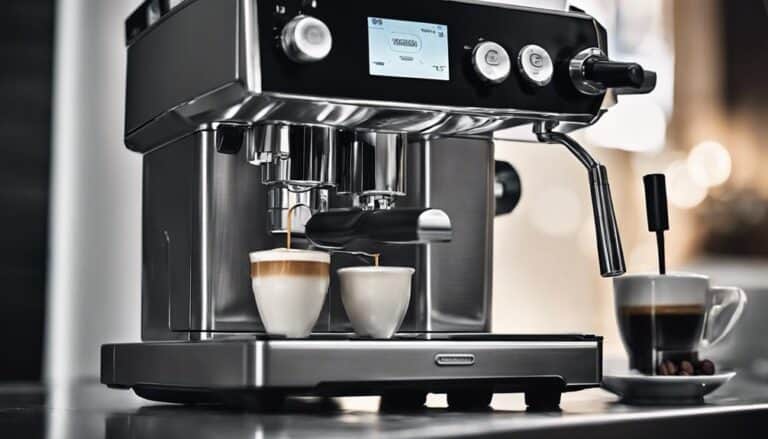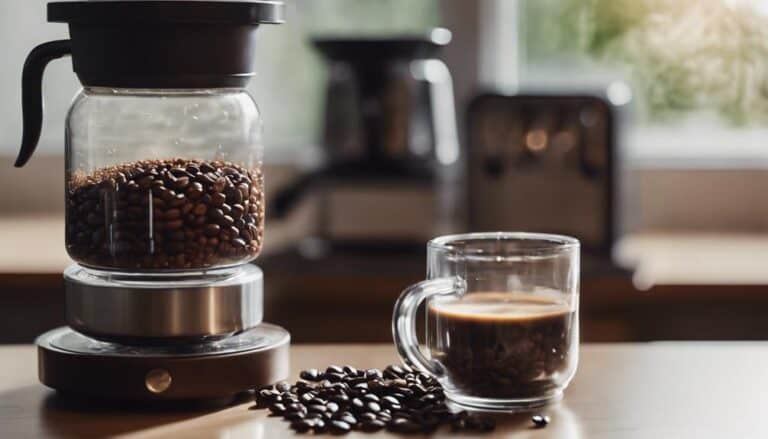How Much Caffeine Do Chai Tea Lattes Have?
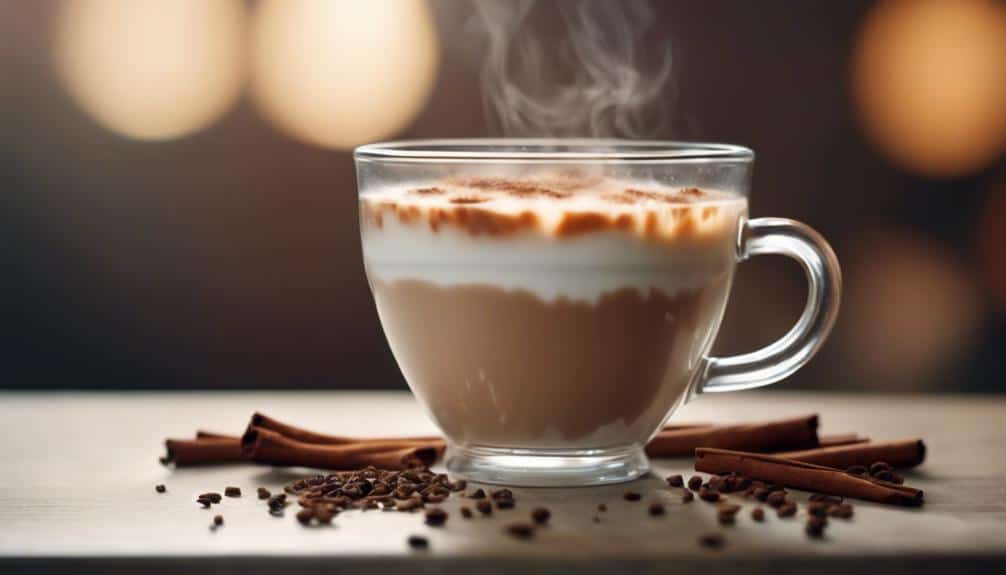
I was surprised to learn that the caffeine content in chai tea lattes can vary depending on several factors. It made me ponder about the specific elements that influence the levels of caffeine in this popular drink. Understanding these factors could shed light on how much of a kick we can expect from our favorite chai latte. It's fascinating to contemplate how something as seemingly simple as a beverage can have such intricacies.
Caffeine Content in Chai Tea Lattes
Analyzing the caffeine content in chai tea lattes reveals an essential range of 30-50mg of caffeine in a standard 8-ounce serving. Compared to coffee, chai lattes have a lower caffeine content, making them a suitable choice for individuals seeking a milder energy boost. The amount of caffeine in chai tea lattes can vary depending on factors such as the type of black tea used as the base and the preparation method employed.
Despite the lower caffeine levels, chai lattes still offer several health benefits. The tea base in chai provides antioxidants that support overall well-being. Additionally, the spices commonly found in chai, such as cinnamon, cardamom, and ginger, can aid in digestion and provide anti-inflammatory properties.
Understanding the caffeine content in chai tea lattes is crucial for those monitoring their caffeine intake. By being aware of the approximate caffeine levels in a standard serving, individuals can make informed decisions about their beverage choices while still enjoying the delightful flavors and potential health perks of chai lattes.
Factors Affecting Caffeine Levels
When considering the factors affecting caffeine levels in Chai Tea Lattes, two key points stand out: the brewing time and the quality of the tea leaves used.
The longer the tea is steeped, the higher the caffeine content, while the type and grade of black tea can influence the baseline level.
Understanding these factors can help determine the caffeine content of your Chai Tea Latte based on your preferences and needs.
Brewing Time Impact
The caffeine levels in Chai Tea Lattes are significantly influenced by the duration of brewing the black tea used in the drink. Adjusting the brewing time allows for customization of caffeine levels in Chai Tea Lattes to suit individual preferences.
Longer brewing times typically result in higher caffeine content, while shorter durations may lead to lower caffeine levels in the Chai Tea Latte. The standard brewing time for black tea in Chai Tea Lattes usually ranges from 3 to 5 minutes to extract caffeine and flavor effectively.
Tea Leaf Quality
Considering the influence of tea leaf quality on caffeine levels, the composition of the blend plays a pivotal role in determining the overall caffeine content of Chai Tea Lattes. The quality of tea leaves used, including factors like origin, processing methods, type of tea leaves (such as black or green), and tea leaf grade, all contribute to the caffeine levels in the final chai latte. Higher quality tea leaves generally contain more caffeine, impacting the overall potency of the drink.
Variations in caffeine levels can be attributed to the specific characteristics of the tea leaves selected for the blend. Hence, when evaluating the caffeine content of Chai Tea Lattes, the quality of the tea leaves used is an important factor to take into account.
Comparison With Other Beverages
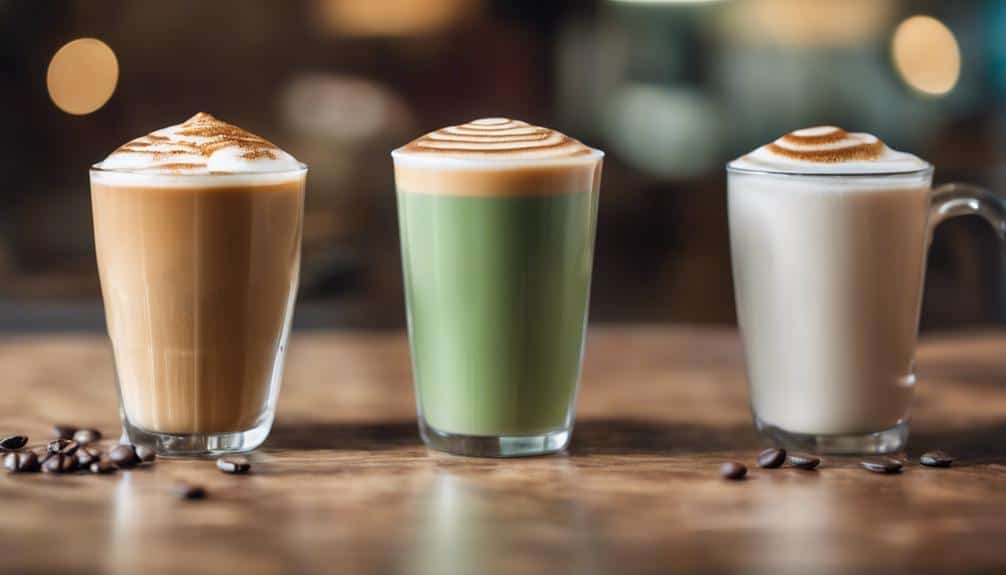
Comparing the caffeine content of Chai Tea Lattes to other popular beverages reveals a noticeable difference in energy-boosting potential. A typical 8-ounce Chai Tea Latte contains approximately 30-50mg of caffeine, lower than coffee, which can pack 100-200mg in the same serving size.
The caffeine in Chai Tea Lattes primarily comes from the black tea base, offering a milder energy boost compared to espresso-based drinks. This makes Chai Tea Lattes a balanced option for individuals seeking to moderate their caffeine intake.
For those sensitive to higher caffeine levels, Chai Tea Lattes serve as a flavorful and soothing alternative. The blend of black tea, spices, and milk in Chai Tea Lattes provides a unique taste profile along with a moderate caffeine kick.
When looking for a beverage that delivers a moderate energy boost without overwhelming sensitivity to caffeine, Chai Tea Lattes stand out as a versatile and enjoyable choice.
Impact on Alertness and Sleep
Chai tea lattes can provide a boost in alertness due to their caffeine content, with approximately 10 mg per ounce.
However, consuming these beverages late in the day might disrupt sleep patterns, as the caffeine content can interfere with falling asleep.
It's essential to monitor chai tea latte intake, as the caffeine amounts can vary between 6 to 20 mg per ounce, influencing both alertness and potential sleep disturbances.
Alertness and Chai Tea
How does the caffeine content in chai tea lattes impact alertness and sleep patterns?
Chai tea lattes contain caffeine from black tea, providing a mild energy boost. This caffeine content, approximately 10 mg per ounce, can enhance alertness.
However, consuming chai tea lattes later in the day might disrupt sleep patterns due to the stimulating effects of caffeine. It's essential to monitor your caffeine intake from chai tea lattes to manage alertness levels effectively and prevent disturbances in sleep.
Understanding how the caffeine in chai tea lattes affects alertness and sleep quality is crucial for maintaining overall well-being. Balancing your consumption can help you enjoy the benefits of the energy boost without compromising a good night's rest.
Sleep and Chai Lattes
The impact of consuming chai lattes on alertness and sleep quality is influenced by the caffeine content present in the beverage. Chai lattes, with approximately 10 mg of caffeine per ounce, can boost alertness due to the caffeine found in black tea. However, the caffeine in chai lattes might interfere with sleep if consumed too close to bedtime, as caffeine's half-life ranges from 3 to 5 hours.
Particularly, traditional chai servings in India are smaller (4-ounce cups) compared to the oversized Western chai latte portions, affecting caffeine intake. For instance, a tall chai latte at Starbucks, equivalent to three Indian servings, contains around 6 mg of caffeine per ounce. Monitoring caffeine intake from beverages like chai lattes is crucial, especially considering the recommended daily limit of 400 mg per person.
Caffeine Sensitivity Considerations
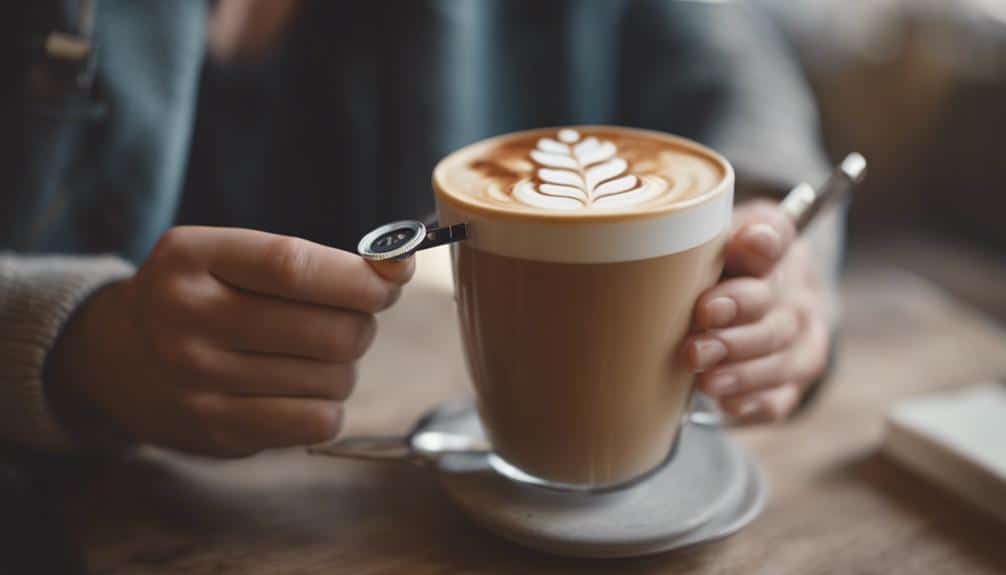
It's essential to acknowledge that individuals' varying levels of sensitivity to caffeine play a significant role in how their bodies process and react to the intake of this stimulant. Factors such as age, weight, genetics, and overall health can influence how sensitive a person is to caffeine.
Individuals with lower caffeine sensitivity may feel stronger effects from smaller doses, while those with higher sensitivity may need larger amounts to experience noticeable effects. Caffeine sensitivity can impact various aspects of an individual's well-being, including sleep quality, anxiety levels, and heart rate.
Being aware of one's own caffeine sensitivity can help in making informed choices about beverage consumption and daily caffeine intake. By understanding how caffeine affects them personally, individuals can tailor their consumption to optimize their health and well-being, ensuring that they enjoy the benefits of caffeine while minimizing any negative effects.
Health Implications of Consumption
Considering the potential effects of caffeine sensitivity on individuals, exploring the health implications of consuming chai tea lattes becomes essential to understand the overall impact on well-being and cardiovascular health. Chai tea lattes typically contain 30-50mg of caffeine per 8-ounce serving, offering a moderate caffeine boost.
Moderate consumption of chai tea lattes can provide antioxidants that benefit blood pressure and overall health. However, excessive caffeine intake from chai tea lattes may result in increased heart rate and high blood pressure, potentially impacting cardiovascular health.
Compared to coffee, chai tea lattes are lower in caffeine, making them a suitable choice for individuals sensitive to caffeine. It's important to monitor caffeine intake from chai tea lattes to manage potential effects on anxiety, insomnia, and overall mental health.
Tips for Managing Caffeine Intake
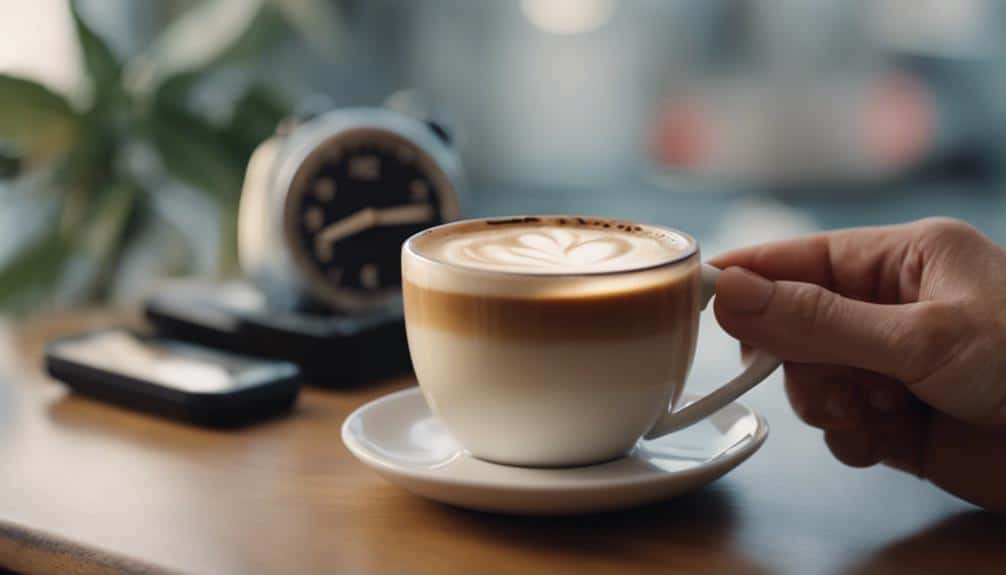
To effectively manage your caffeine intake, it's essential to be aware of the various sources of caffeine in your chai tea latte consumption. A standard 8-ounce chai tea latte typically contains 30-50mg of caffeine, making it a lower caffeine option compared to coffee.
If you're sensitive to caffeine, consider choosing decaffeinated chai tea lattes to enjoy the flavor without the stimulating effects. Be cautious of additional caffeine from espresso shots in specialty variations like Dirty Chai lattes, as these can greatly increase the overall caffeine content.
Timing is also important when consuming chai tea lattes, especially in the afternoon or evening, to avoid disrupting your sleep due to caffeine consumption. It's advisable to check the caffeine content of chai tea latte concentrates from different chains like Starbucks to make informed decisions about your caffeine intake.
Conclusion
To sum up, chai tea lattes typically contain 30-50mg of caffeine per 8-ounce serving, providing a moderate energy boost compared to coffee. Factors such as the type of tea and brewing method can impact caffeine levels, with specialty variations potentially offering higher amounts.
It's important to be mindful of overall caffeine intake, especially for those sensitive to its effects. Decaffeinated chai options are available for those looking to enjoy the taste without the caffeine.

